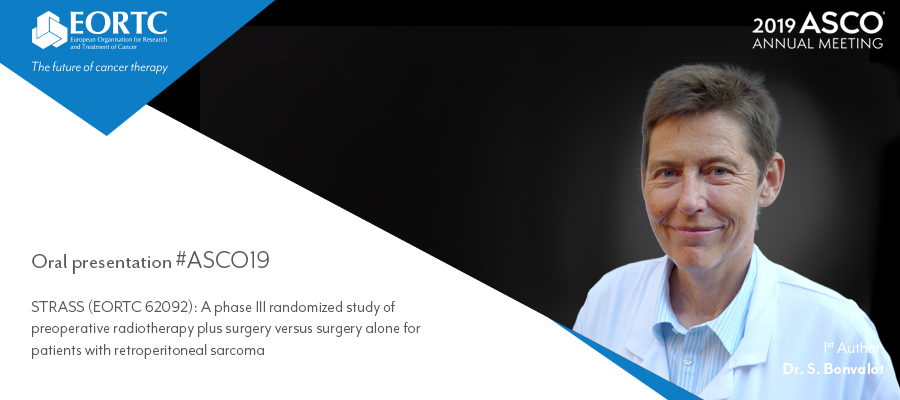Looking for answers in the search for the best treatment of retroperitoneal sarcoma
3 Jun 2019
Chicago, USA: Retroperitoneal sarcoma is a malignancy where tumours develop in the tissue at the back of the abdomen next to the kidneys. It is rare, occuring in fewer than one in every 100,000 people, and the fact that is difficult to diagnose has meant that its management can be challenging. Now Investigators sponsored by the European Organisation for the Research and Treatment of Cancer (EORTC) have carried out a trial to see if adding pre-operative radiotherapy to surgery, the standard treatment, has advantages over surgery alone.
At the American Society of Clinical Oncology (ASCO) Annual Meeting today (Monday) Professor Sylvie Bonvalot, head of the sarcoma unit at the Institut Curie, Paris, France, and coordinator of the study will discuss the findings of the trial. Researchers from eight countries collaborated to recruit 266 adult patients from Europe, the USA and Canada between 2012 and 2017, and randomised them into two groups. One group had surgery preceded by radiotherapy, and the second surgery alone – the current standard treatment.
Because these sarcomas are so rare, organising clinical trials is very difficult. Firstly, finding enough patients to be able to present a reliable result is a problem, and acquiring funding is also a major concern. « In academic trials of rare diseases like this, the involvement of a non-profit organisation like EORTC is essential, » Prof Bonvalot explains. « It is practically impossible to find industry funding for an academic trial of a condition that affects so few people, but it is something that needed to be done, since the results of existing studies looking at the addition of radiotherapy were very contradictory.»
The results were analysed to see if there was a difference between the two groups in the cancer returning in or near to its original site. «A localised return of the tumour is the cause of death in the majority of these sarcomas, » says Prof Bonvalot.
In the retroperitoneum, the two most common tumour subtypes are liposarcoma and leiomyosarcoma, cancers that look like fat and smooth muscle respectively. Although adding radiotherapy did not benefit the group as a whole, the researchers found that it might have a positive effect in those patients who had well-differentiated and dedifferentiated liposarcomas,whereas leiomyosarcoma did not benefit from this strategy.
« Retroperitonal tumours have a tendency to be hidden and to grow slowly. Often they are fairly large before they are detected, and that makes it even more urgent to find the best treatment for them,» Dr Bonvalot says. « The trial is globally negative, and radiotherapy did not impact the abdominal recurrence-free survival on the whole population studied. However, in the sensitivity analysis, well and dedifferentiated liposarcoma seemed to benefit from this strategy whereas high grade sarcoma and leiomyosarcoma did not. We need to conduct further follow up to assess this difference »
Abstract #11001
The research was funded by the EORTC and EUROSARC
Related News
Meet the new EORTC Board
9 Jul 2024
We are pleased to announce the release of the EORTC 2023 Annual Report
17 Jun 2024
Dr Denis Lacombe, EORTC CEO, appointed stakeholder co-chair of ACT EU advisory group
24 May 2024
Clinical Trials Day 2024: a Q&A on pragmatic clinical trials
20 May 2024
EORTC/EMA workshop suggests an international way forward for treatment optimisation studies
8 May 2024
EORTC’s Participation at the ESTRO Congress 2024
29 Apr 2024
EORTC: Advancing research and treatment for rare cancers
29 Feb 2024
EORTC Fellowship Programme: celebrating more than 20 years of impactful collaboration
22 Feb 2024
Appointment of Malte Peters as EORTC Strategic Alliance Officer
9 Feb 2024
Unique series of workshops in partnership with the European Medicines Agency (EMA)
7 Feb 2024


